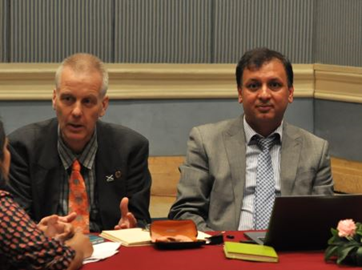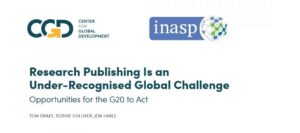
Publishing in journals of the NepJOL family
– Guest Post by Edwin van Teijlingen, Professor of Reproductive Health Research at Bournemouth University and Padam Simkhada, Padam Simkhada, Professor of International Public Health at Liverpool John Moores University
Recently we were asked why we publish so often in Nepalese published English-language journals that are part of the NepJOL platform. Between us we have 38 articles and editorials in NepJOL journals, including papers in Nepal Journal of Epidemiology, Health Prospect, Kathmandu University Medical Journal, Health Renaissance and the Journal of Manmohan Memorial Institute of Health Sciences. We have a whole range of easy answers to this question, including ones such as: we both love Nepal; we are on the editorial board of a few journals that are part of the NepJOL group; and editors invite us to submit articles and/or editorials. On reflection we feel the underlying reasons for publishing on NepJOL are slightly more subtle.
We feel that our key principles of working in low-income countries are very similar. These principles are (a) conducting applied academic research in low-income countries for the greater good; (b) helping to build research-capacity; and (c) telling the world about our research through quality academic publications.
These key principles include doing the best possible job with limited resources whilst building research capacity in individuals and organisations. In terms of research we want to do the kind of research that helps address the needs of the poorest in society, including rural women and People Living with HIV/AIDS, in other words research for the greater good. In terms of research capacity building we want to help, support or advise people in low-income countries who haven’t had the same opportunities we have had, as well as improve the capacity of a country like Nepal to conduct its own high quality research. Low income countries have many challenges to publishing research; one of the key obstacles in Nepal until recently was the lack of incentives for academics to publish. And last, but not least, we have our personal publishing strategy. As with all UK academics, we have to publish in high-impact scientifically influential journals for the development of our careers. At the same time we also like to publish in new and fairly recently established journals in Nepal.
We publish in NepJOL journals as part of our contribution to research capacity building in Nepal. We often publish with local authors for whom such publication is their first academic paper. Many of these first authors were originally our PhD Nepali students in the UK, but more recently they include junior colleagues we have worked with on research and intervention projects in Nepal. We believe that when we submit good quality academic manuscripts we help to raise the standard of the journal.
Publishing in NepJOL also has a key advantage that published papers will be Open Access and as such easily available free of cost to any reader across the globe. If we publish our papers in a subscription- only scientific journals in Europe or the Americas, only people who can afford to pay for the paper or the subscription can access our research findings. A good researcher would want the world to know what the research findings and implications are so that others can learn from it.
At a more mundane level, an additional advantage of publishing in NepJOL is that physical copies of the journals are often available in local college libraries in Nepal. We have visited several colleges in Nepal that had a collection of NepJOL journals, available for students as well as staff without internet facilities and who cannot access the online version. As we do a lot of research in Nepal on maternity care, migrant workers, post-earthquake disaster relief, etc. it makes sense to use NepJOL journals to disseminate our work.
Of course we have our favourite publications. We are both very proud of ‘Factors influencing sexual behaviour between tourists and tourism employees: A systematic review’ published this year in the Nepal Journal of Epidemiology. This publication is also a first published systematic review paper for two of the co-authors. We are also proud of a slightly older paper ‘Major Problems and Key Issues in Maternal Health in Nepal’ published in Kathmandu University Medical Journal. This paper has been cited widely, it has 44 citations in Google Scholar (as of September 2016), which indicates that papers published in Nepalese journals are getting read and quoted if they are relevant and of good quality.
We therefore hope to continue publishing in Nepalese journals on the NepJOL platform in the future.
Please see the NepJOL website for the full lists of papers authored by Edwin Van Teijlingen and Padam Simkhada
More about the authors
Edwin van Teijlingen is Professor of Reproductive Health Research at Bournemouth University. He is a medical sociologist with a career of two decades in Maternal Health and Midwifery. He has conducted health services and health education research in the UK and in Asia (Bangladesh, India & Nepal). He has published over 250 articles and book chapters on various aspects of health and health care. He is also Visiting Professor at two colleges in Nepal.
Padam Simkhada is Professor of International Public Health at Liverpool John Moores University, where he is also Associate Dean (Global Engagement) for the Faculty of Education, Health & Community. His research includes maternal health, health promotion, migration, sex trafficking, and reproductive and sexual health, including HIV/AIDS. He has been involved with capacity building activities in developing countries particularly related to evidence synthesis and systematic reviews. He has published a wide range of over 125 peer-reviewed journal articles and book chapters related to his research field and majority of them are related to Nepal.

 Previous Post
Previous Post


